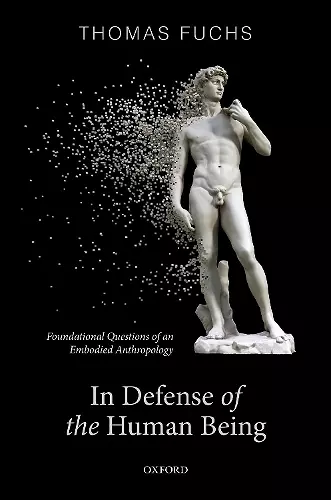In Defence of the Human Being
Foundational Questions of an Embodied Anthropology
Format:Hardback
Publisher:Oxford University Press
Published:23rd Sep '21
Should be back in stock very soon

With the progress of artificial intelligence, the digitalization of the lifeworld, and the reduction of the mind to neuronal processes, the human being increasingly appears to be just a product of data and algorithms. That is, we conceive ourselves “in the image of our machines”, and conversely, we elevate our machines and our brains to new subjects. At the same time, demands for an enhancement of human nature culminate in transhumanist visions of taking human evolution to a new stage. Against this self-reification of the human being, this book defends a humanism of embodiment: our corporeality, vitality, embodied freedom are the foundations of a self-determined existence, which uses these new technologies only as a means, instead of letting them rule us. In Defence of the Human Being offers an array of interventions directed against a reductionist naturalism or transhumanism in various areas of science and society. As alternative it offers an embodied and enactive account of the human person: we are neither pure minds nor brains, but primarily embodied, living beings in relation with others. Fuchs applied this concept to issues such as artificial intelligence, transhumanism and enhancement, virtual reality, neuroscience, embodied freedom, psychiatry, and finally to the accelerating dynamics of current society which lead to an increasing disembodiment of our everyday conduct of life. Cutting across neuroscience, philosophy, and psychiatry, this important new book applies cutting-edge concepts of embodiment and enactivism to the current scientific, technological and cultural tendencies that will crucially influence our society's development in the 21st century.
Thomas Fuchs' book, implicitly arguing for the necessity of vulnerability, persuades the reader to re-shape the definition of major categories -such as subjectivity, health, and wellbeing and to find, in liminality itself, the richness of our existence. * Valeria Bizzari, Husserl Archives, KU Leuven, Belgium, Journal of the British Society for Phenomenology *
In Defense of the Human Being is a book which serves as a compass, both for philosophers, clinicians and neuroscientists. It reminds us that humans cannot be dualistically divided into two different substances, rather that they are made of flesh and blood: they experience, the feel, they think - as embodied living subjects, embedded into the world and in a reciprocal relationship with it. "Life can be known only by life", wrote Hans Jonas (Jonas, 2001); through this work, Thomas Fuchs revitalizes this lesson and drives philosophy in confrontation with the new challenges of our time. * Francesca Brencio, Department of Philosophy, University of Seville, Seville, Spain, Philosophical Psychology *
This provocative book is to be welcomed for the lucidity, breadth and intelligence of its arguments. It will be a valuable resource for students, academics and therapists, and for anyone who has ever suspected that mainstream psychology in this country is in danger of congealing into dogma. * Paul Moloney, The Psychologist Website *
In Defense of the Human Being is a book which serves as a compass, both for philosophers, clinicians and neuroscientists. * Francesca Brencio, Department of Philosophy, University of Seville, Seville, Spain, Philosophical Psychology *
ISBN: 9780192898197
Dimensions: 240mm x 162mm x 22mm
Weight: 598g
272 pages